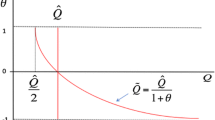Abstract
Principals usually try to elicit the quality and behavior of agents from their performance. While sometimes success or failure in production does not provide accurate information about the agents, there may be activities not directly related to production that constitute a more precise signal. I show that, when agents face reputation concerns, introducing these activities after a success improves efficiency, while introducing them after a failure reduces efficiency. Hence, nesting activities in the right way may offer a cheap toolbox to provide incentives. As an illustration, I consider a model where reputation concerns drive the hiring decisions of managers in a firm and I show how scapegoating, an activity “nested” after failures in production, generates inefficiencies. While hiring efficient workers increases the probability of success, hiring less efficient workers provides a buffer against reputation loses from failures, since managers can blame them more easily.
Similar content being viewed by others
References
Alesina, A., Tabellini, G.: Why Do Politicians Delegate? NBER WP 11531 (2005)
Alesina A., Tabellini G.: Bureaucrats or politicians? Part I: a single policy task. Am Econ Rev 97, 169–179 (2007)
Alesina A., Tabellini G.: Bureaucrats or politicians? Part II: multiple policy tasks. J Public Econ 92, 425–447 (2008)
Alonso-Pauli, E., Perez-Castrillo, D.: Codes of best practice in competitive markets for managers. Econ Theory (2010). doi:10.1007/s00199-010-0537-y
Bell N.E., Tetlock P.E.: The intuitive politician and the assignment of blame in organizations. In: Giacalone, R., Rosenfel, P. (eds) Impression Management in the Organization, pp. 105–123. Erlbaum, Hillsdale (1989)
Cappelen A., Tungodden B.: Rewarding effort. Econ Theory 39, 425–441 (2009)
Cole, H., Kehoe P.: Reputation Spillover Across Relationships: Reviving Reputation Models of Debt. NBER WP 5486 (1996)
Cripps M., Mailath G., Samuelson L.: Imperfect monitoring and impermanent reputations. Econometrica 72, 407–432 (2004)
Cripps M., Mailath G., Samuelson L.: Disappearing private reputations in long-run relationships. J Econ Theory 134, 287–316 (2007)
Dewan T., Myatt D.: The declining talent pool of government. Am J Polit Sci 54, 267–286 (2010)
Dezso, C.: Scapegoating and Firm Reputation. Mimeo, Stern School of Business, New York University (2004)
Douglas T.: Scapegoating: Transferring Blame. Routledge, London (1995)
Dowding, K., Dumont, P.: The Selection of Ministers in Europe. Routledge Advances in European Politics. Routledge, London (2008)
Ely J., Valimaki J.: Bad reputation. Q J Econ 118, 785–814 (2003)
Fudenberg D., Levine DK.: Reputation and equilibrium selection in games with a patient player. Econometrica 57, 759–778 (1989)
Fudenberg D., Levine D.K.: Maintaining a reputation when strategies are imperfectly observed. Rev Econ Stud 59, 561–579 (1992)
Huson M.R., Malatesta P.H., Parrino R.: Managerial succession and firm performance. J Financial Econ 74, 237–275 (2004)
Koch A., Peyrache E.: Mixed up? That’s good for motivation. Econ Theory 34, 107–125 (2008)
Kreps D., Wilson R.: Reputation and imperfect information. J Econ Theory 27, 253–279 (1982)
Levy G.: Careerist judgesand the appeals process. RAND J Econ 36, 275–297 (2005)
Mailath, G., Samuelson, L.: Your Reputation is Who You’re Not, Not Who You Would Like to Be, CARESS, WP 98–11. University of Pennsylvania (1998)
Mailath G., Samuelson L.: Who wants a good reputation?. Rev Econ Stud 68, 415–441 (2001)
Mailath G., Samuelson L.: Repeated Games and Reputations. Oxford University Press, New York (2006)
Martin, J.: Changing Accountability Relations: Politics, Consumers and the Market. Public Management Service, OECD (1997)
Miettinen, T.: Paying attention to payoffs in analogy-based learning. Econ Theory (2010). doi:10.1007/s00199-010-0565-7
Milgrom P., Roberts J.: Predation, reputation and entry deterrence. J Econ Theory 27, 280–312 (1982)
Mylovanov T., Schmitz P.: Task scheduling and moral hazard. Econ Theory 37, 307–320 (2008)
Polidano C.: The bureaucrat who fell under a bus: ministerial responsibility and the Derek Lewis affair in Britain. Governance 12, 201–229 (1999)
Segendorff, B.: A Signalling Theory of Scapegoats. Mimeo, Stockholm School of Economics (2000)
Tadelis S.: Firm reputation with hidden information. Econ Theory 21, 635–651 (2003)
Winter, E.: Scapegoats and Optimal Allocation of Responsibilities. Mimeo, Hebrew University of Jerusalem (2001)
Author information
Authors and Affiliations
Corresponding author
Additional information
I would like to thank the editor, an anonymous referee, Christian Hellwig, David K. Levine, Joe Ostroy, Larry Samuelson, Vasiliki Skreta, Jeroen Swinkels, Bill Zame, and seminar participants at UCLA, Minnesota, and Washington University in St. Louis, for useful comments. The usual waiver of liability applies.
Rights and permissions
About this article
Cite this article
Ordoñez, G. Reputation from nested activities. Econ Theory 52, 915–940 (2013). https://doi.org/10.1007/s00199-011-0672-0
Received:
Accepted:
Published:
Issue Date:
DOI: https://doi.org/10.1007/s00199-011-0672-0




